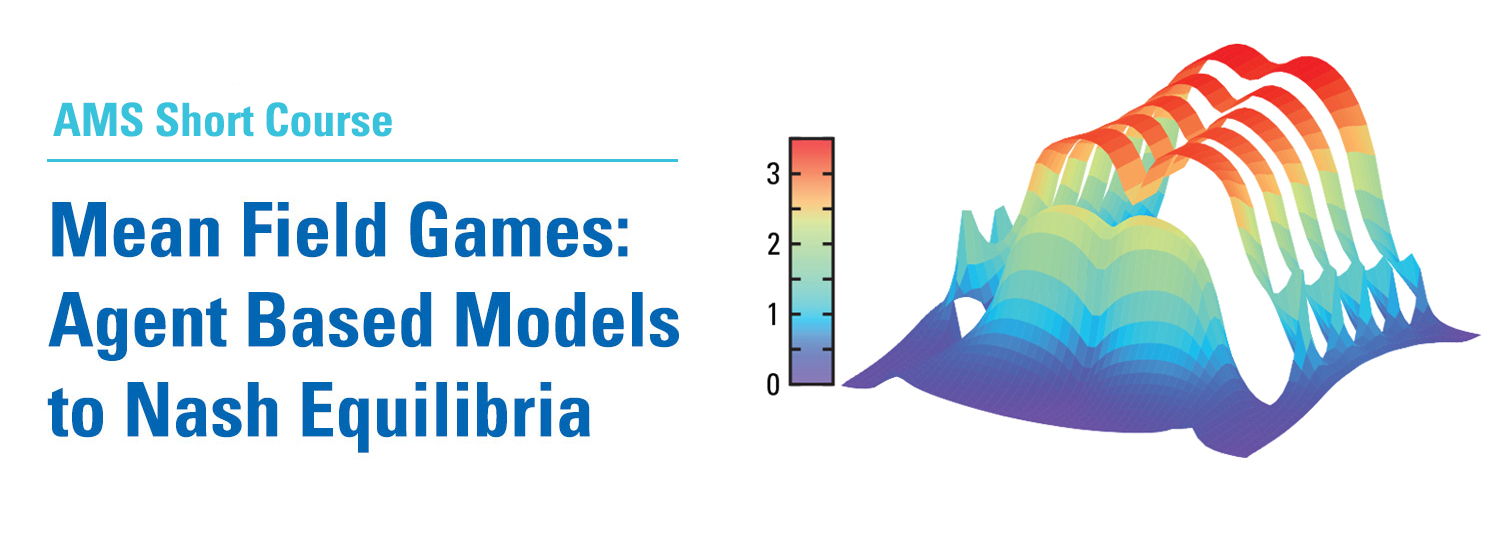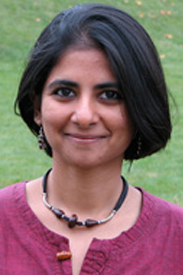

Visit our AMS COVID-19 page for educational and professional resources and scheduling updates

The mathematical theory of mean field games goes back to the pioneering works of Lasry and Lions on the one hand, and of Caines, Huang, and Malhamé on the other. Publications from these two groups appeared independently more than ten years ago. Generally speaking, the purpose of mean field game theory is to address Nash equilibria within large populations of rational (non-cooperative) agents featuring sufficiently many symmetries. Among others, the states of the agents depend on a time-dependent controlled parameter, the underpinning dynamics being possibly stochastic; also, the agents themselves are required to interact with one another through their collective distribution; such a form of interaction has been intensively used in statistical physics and is usually referred to as being of mean field type. Typical questions in mean field games address the characterization of the Nash equilibria together with their existence and uniqueness whenever the population consists of a continuum of players and is thus infinite. In this regard, properly justifying the passage from games with a large but finite number of players to games with a continuum of players is a difficult question, on which recent progress has been made.
Since its introduction, the subject has been growing rapidly from both the theoretical and applied sides. Part of the success comes from the fact that the theory appeals to several different topics in mathematics, including partial differential equations, control theory, game theory, probability, and optimal transportation. Another key fact for explaining the interest in mean field games is the wide spectrum of applications that the theory offers: While the subject is originally motivated by work in economics, it is now used for modeling many other practical phenomena such as crowd motion, flocking of animals, financial markets, energy markets, security of cyber networks, etc. Generally speaking, it comes as a complement to agent based models.
The purpose of the course is to offer insight into the theory and its applications for an audience comprising non-specialists and early-career specialists. The two days will contain a series of six lectures, including one introductory lecture, three lectures on the theory, one on the applications to economics, and one on the numerical aspects. The most theoretical lectures will be complemented with exercise sessions. The lecture on the numerical aspects will include a demo session. Familiarity with PDEs, control theory, or probability theory may be useful.
The objective of the course is to provide an accessible overview of the field to non-specialists. Lectures will address theoretical issues, numerical challenges and practical applications. All the speakers are experts in the field:

François Delarue
Université Nice-Sophia Antipolis, Co-author with René Carmona of a two-volume book on the probabilistic approach to mean field games
![]() MR Author Profile
MR Author Profile
The purpose of this lecture is to introduce the master equation, which is a partial differential equation defined on the space of probability measures and which turns out to read as the analogue of the so-called Nash system in game theory, but for a continuum of players. This equation was originally used by J. M. Lasry and P. L. Lions to address mean field games when players in the game are all subjected to the same noise, which is then said to be a common noise.
In short, the equation provides an Eulerian point of view on the game.
The purpose of the lecture is not only to present the equation and the related solvability results, but also to expose the basic tools that are needed to understand it. These include differential calculus on the space of probability measures and the uniqueness criterion due to J. M. Lasry and P. L. Lions, the latter writing as a monotonicity condition on the cost functional with respect to the measure argument. The lecture will end with an exercise session.
François Delarue is a professor at the Université Nice Sophia Antipolis. He has been working on the probabilistic approach to mean field games for several years. Together with René Carmona, he wrote a two-volume book on the subject, Probabilistic Theory of Mean Field Games with Applications, I and II, which was published by Springer in 2018.

Daniel Lacker
Columbia University, Author of a series of papers in the field, including several on the connection between finite-player games and mean field games
![]() MR Author Profile
MR Author Profile
Daniel Lacker, with others, has showed how the notion of relaxed controls was useful both to solve mean field games with high-level complexity (like mean field games with a common noise) and to prove the convergence of the solutions to games with finitely many players to mean field games, the latter being precisely referred to as “the convergence problem in mean field games.”
The convergence problem is known to be a difficult question in the field. The purpose of the lecture is to review the notion of “propagation of chaos,” which is at the core of the whole theory, and to discuss two main strategies for addressing the problem: first, to use the master equation, whenever it has a smooth solution; second, to use compactness arguments and related notions of relaxed controls in stochastic control theory. The lecture will end with an exercise session.

Mathieu Laurière
Princeton University, Developed several numerical methods and code for mean field games
![]() MR Author Profile
MR Author Profile
Mathieu Laurière is a post-doctoral student at Princeton. He earned his PhD in Paris, France, under the supervision of Yves Achdou, who is one of the top experts in deterministic numerical methods for mean field games. Together with Y. Achdou, Mathieu Laurière worked on the numerical aspect of the field, using the PDE formulation of mean field games and related variational methods.
The need for efficient numerical methods is due to the fact that mean field games admit explicit solutions only in very special cases, such as linear quadratic models. For many applications, numerical methods are hence a fundamental tool for getting insights into the shape of the solutions and obtaining quantitative results.
In this lecture, Mathieu Laurière will mostly focus on two families of numerical methods. The first one is based on a fixed point approach, which is inherent to the definition of Nash equilibrium. The second one is based on the variational structure exhibited by many mean field games. The latter family of methods can, more generally, be applied to solve cooperative problems. Several numerical illustrations (including models for congestion effects in crowd motion) will be provided.

Roland Malhamé
École Polytechnique de Montréal, One of the founders of the field who has been working recently on applications to engineering
![]() MR Author Profile
MR Author Profile
Co-Presenting with Christy Graves
Roland Malhamé is a professor at the Polytechnique Montréal. He is one of the co-founders of the theory of mean field games. He published, together with his co-authors Peter Caines and Minyi Huang, earlier articles on the so-called “Nash certainty equivalence,” which is another name for “mean field games.” Christy Graves earned her PhD under the supervision of René Carmona and has written several contributions on the subject.
In this introductory lecture, Roland Malhamé will address the roots of the theory starting from motivations in engineering and addressing the so-called linear quadratic setting. He will explain how solutions to mean field games may be tackled in the form of a fixed point argument over the flow of marginal distributions of a stochastic control problem. This approach can serve to construct approximate decentralized Nash equilibria to games with finitely many players. Roland Malhamé will also explain the connection with cooperative games with a continuum of players. After the lecture, Christy Graves will organize an exercise session on linear quadratic mean field games, as the latter are especially convenient for pedagogical purposes. This exercise session should be very helpful for neophytes.

Christy Graves
Princeton University
Christy Graves earned her PhD under the supervision of René Carmona and has written several contributions on the subject.
![]() MR Author Profile
MR Author Profile
Co-Presenting with Roland Malhamé
Christy Graves earned her PhD under the supervision of René Carmona and has written several contributions on the subject. Roland Malhamé is a professor at the Polytechnique Montréal. He is one of the co-founders of the theory of mean field games. He published, together with his co-authors Peter Caines and Minyi Huang, earlier articles on the so-called “Nash certainty equivalence,” which is another name for “mean field games.”
In this introductory lecture, Roland Malhamé will address the roots of the theory starting from motivations in engineering and addressing the so-called linear quadratic setting. He will explain how solutions to mean field games may be tackled in the form of a fixed point argument over the flow of marginal distributions of a stochastic control problem. This approach can serve to construct approximate decentralized Nash equilibria to games with finitely many players. Roland Malhamé will also explain the connection with cooperative games with a continuum of players. After the lecture, Christy Graves will organize an exercise session on linear quadratic mean field games, as the latter are especially convenient for pedagogical purposes. This exercise session should be very helpful for neophytes.

Kavita Ramanan
Brown University, Working recently on applications of major concepts of probability theory, such as the Central Limit Theorem or large deviations principle, to mean field games
![]() MR Author Profile
MR Author Profile
Kavita Ramanan is a professor at Brown University. She is an expert in large deviation principles, which are used to study rare events in probability theory. She has been working on mean field games for several years, including some recent works on deviations and fluctuations in the convergence problem.
Deviations and fluctuations in the convergence problem provide more precise pictures on the passage from games with finitely many players to mean field games. In this regard, deviations and fluctuations are complementary: Fluctuations are usually manifested in the form of a central limit theorem that tells the typical size of the fluctuations of the in-equilibrium collective state (seen as an empirical distribution) of the finite game around the asymptotic regime given by the solution to the mean field game. In contrast, large deviations are used to describe large (exceptional) deviations of the former empirical distribution away from the latter mean field game equilibrium. The strategy makes extensive use of the master equation and exemplifies the fact that the latter, when it has a classical solution, becomes a very efficient tool in the analysis of the convergence problem. The lecture will end with an exercise session.

René Carmona Princeton University
![]() MR Author Profile
MR Author Profile
René Carmona is a professor at Princeton University. He is an expert in mathematical finance, and he has been working on the theory and the applications of mean field games for over a decade.
Applications of the mean field game theory to economy and finance are numerous. To wit, earlier forms of mean field games appeared in the economic literature before the mathematical theory was even formalized. In his lecture, he will review existing models in macro-economics and finance, and address the use of mean field games in contract theory. If time permits, the lecture will conclude with an open discussion on the new applications of mean field games and the related emerging trends.